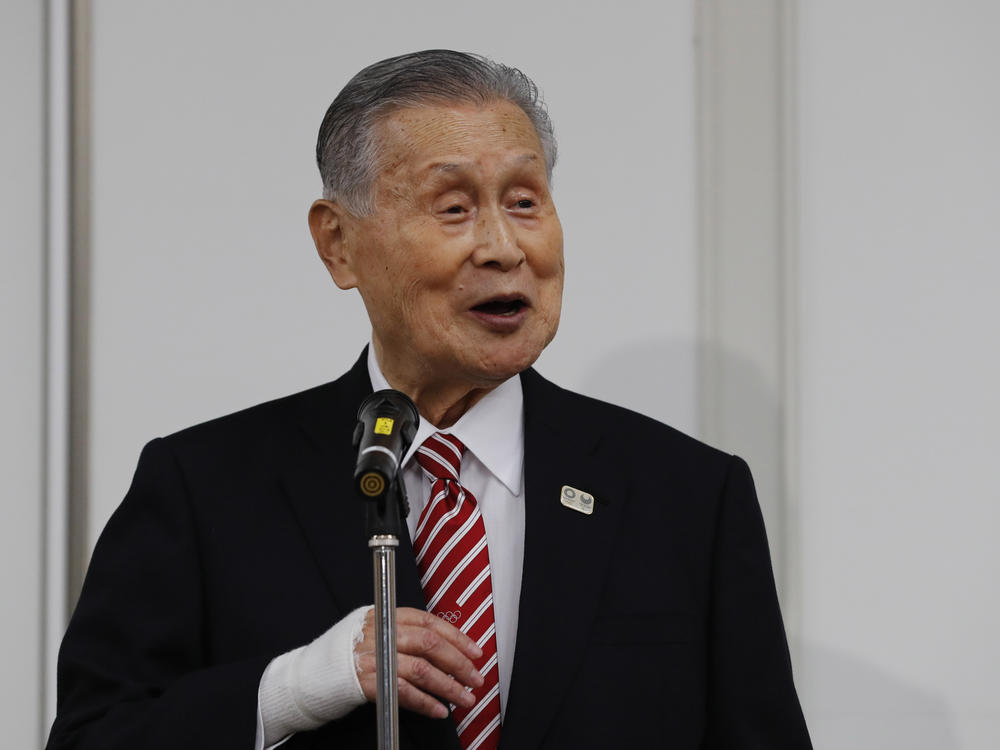Section Branding
Header Content
Yoshiro Mori Reportedly Plans To Quit As Japan's Olympic Chief Over Sexist Remarks
Primary Content
Japan's Olympic organizing chief, Yoshiro Mori, plans to resign Friday amid a firestorm of criticism about his remarks disparaging women's participation in organizing the games, according to Japanese news reports.
Outlets including public broadcaster NHK and the Kyodo news agency quoted anonymous sources close to Mori as saying he plans to step down at a meeting of the Tokyo Olympic organizing committee, of which he is president.
Japan's Olympic minister said that the meeting would discuss what to do about widespread calls for the 83-year-old committee head to resign. By reportedly telling confidants of his intention to quit ahead of the meeting, Mori may have dodged an embarrassing discussion of his remarks.
Mori had spoken out on Feb. 3 against adding female members to the Japanese Olympic Committee's board, on the grounds that he believed their speaking took up too much time.
Mori later apologized for his comments but refused to resign.
The International Olympic Committee initially said it considered "the issue closed" after Mori's apology, but it later issued a statement saying Mori's remarks were "absolutely inappropriate."
Japanese Prime Minister Yoshihide Suga commented that Mori's remarks are not in line with Japan's national interest, but said whether Mori should continue in the job or not is up to the organizing committee.
Hundreds of Olympic volunteers quit in protest against Mori's comments, as did some Olympic Torch Relay runners. As the pressure mounted, major corporate sponsors began to speak out to Japanese media.
Akio Toyoda, president of Toyota Motors, a worldwide Olympic sponsor, said he was "disappointed" by Mori's remarks, "which are contrary to the values that Toyota respects and supports," according to Reuters, citing Toyoda's statement read out by a subordinate.
Other bosses confided to Japanese media that they feared customers would cancel deals in revulsion at Mori's sexism, and that his remarks further destabilized a sporting event whose fate is already teetering amid the uncertainty caused by the pandemic.
Yayo Okano, a political scientist at Doshisha University in Kyoto, told the Asahi newspaper that Mori's comments "poured salt" on the wounds of many long-suffering Japanese women and exemplified male dominance of public discourse in Japan. "Women cannot speak up, and they are forced to listen to men talking all the time. When women finally speak, they are told, 'You talk too long,'" Okano said.
Mori, however, is not out of the picture. Asahi reports that he will stay on as an adviser to the Games' organizers.
His likely successor is reported to be Saburo Kawabuchi, mayor of the Olympic Village and a former president of the national soccer and basketball leagues. At age 84, he's slightly older than Mori.
Kawabuchi told reporters that he was ready to accept reported requests from the Olympic organizing committee and from Mori himself to take over as successor. "I would like to give it my best effort, as this is the last big role in my life," he said.
Chie Kobayashi contributed to this report from Tokyo.
Copyright 2021 NPR. To see more, visit https://www.npr.org.

